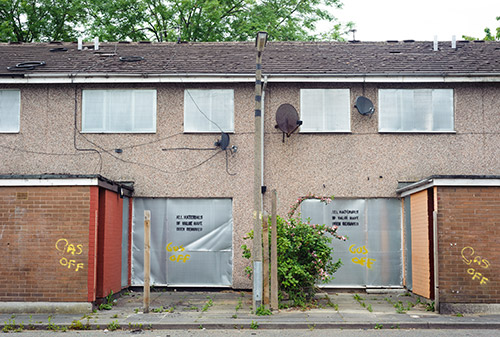




Housing is a major element in an individual’s living standards. Access to housing that is weatherproof, warm and gives those living there a feeling of safety, privacy and personal space, will have a positive impact on their health and well-being.
Poor quality housing can lead to poor mental health and domestic violence. Children can feel anxious, and it can also lead to social isolation as individuals feel unable to invite others into their home.
Poor housing conditions can lead to poor life chances for children due to lack of facilities in the area, such as good schools, social spaces and access to good healthcare.
Homeless individuals and those that fear their communities often feel isolated. Many parents are in despair and worry due to homelessness. The children never know where they will be moved to next and this causes anxiety, depression, and behavioural problems. They may also experience hyperactivity, aggression, bedwetting and soiling.
Children living in cramped temporary accommodation are affected by:
Their education can suffer as they do not have the space and privacy they need to do homework and play.
Children experiencing homelessness or poor housing during their formative years often spend the rest of their lives struggling to catch up. Research shows that those who suffer bad housing have an increased risk of homelessness in adulthood.
Mae tai yn elfen bwysig o safonau byw unigolion. Bydd tai sych a chynnes sy'n cynnig diogelwch, preifatrwydd a gofod personol i'r sawl sy'n byw yno yn cael effaith gadarnhaol ar eu hiechyd a'u lles.
Gall tai o ansawdd gwael arwain at iechyd meddwl gwael a thrais domestig. Gall plant deimlo'n orbryderus a gall hefyd arwain at ynysu cymdeithasol gan nad yw unigolion yn teimlo y gallant wahodd eraill i'w cartref.
Gall cyflwr tai gwael olygu bod plant yn cael llai o gyfleoedd mewn bywyd am fod diffyg cyfleusterau yn yr ardal fel ysgolion da, ardaloedd cymdeithasol a mynediad i ofal iechyd da.
Mae unigolion ddigartref a'r rheini sy'n ofni eu cymunedau yn aml yn teimlo'n ynysig. Mae llawer o rieni yn byw mewn gofid oherwydd digartrefedd. Nid yw'r plant byth yn gwybod i ble y cânt eu symud nesaf, sy'n achosi gorbryder, iselder a chamymddwyn. Gallant hefyd brofi gorfywiogrwydd, natur ymosodol, gwlychu'r gwely a baeddu.
Mae'r canlynol yn effeithio ar blant sy'n byw mewn llety dros dro cyfyng:
Gall eu haddysg ddioddef am nad oes ganddynt y lle na'r preifatrwydd i wneud gwaith cartref a chwarae.
Bydd plant sy'n profi digartrefedd neu dai gwael yn ystod eu blynyddoedd ffurfiannol yn aml yn treulio gweddill eu bywydau yn ceisio dal i fyny. Dengys ymchwil fod y rheini sy'n dioddef tai gwael yn wynebu mwy o risg o fod yn ddigartref fel oedolyn.

Individuals use health and social care services throughout their lives. The needs of an individual vary according to their life stage and the type of conditions they may have. Even a healthy individual will need to use the services for immunisation and education.
Health and social care services support individuals from conception to the end of their lives. A healthy mother will have a healthy child; a healthy child will become a healthy adult. If individuals are healthy, then resources can be used for those who are unfortunate enough to be ill, need looking after whether short, or long term.
Mae pobl yn defnyddio gwasanaethau iechyd a gofal cymdeithasol drwy gydol eu hoes. Mae anghenion unigolyn yn amrywio yn dibynnu ar ei gyfnod mewn bywyd a'r math o gyflyrau a all fod ganddo. Bydd angen i hyd yn oed unigolyn iach ddefnyddio'r gwasanaethau at ddibenion imiwneiddio ac addysg.
Mae gwasanaethau iechyd a gofal cymdeithasol yn cefnogi pobl o'u geni i ddiwedd eu bywydau. Bydd gan fam iach blentyn iach; bydd plentyn iach yn dod yn oedolyn iach. Os yw pobl yn iach, yna gellir defnyddio adnoddau ar gyfer y rheini sy'n mynd yn sâl, ac sydd angen gofal, yn y byrdymor neu'r hirdymor.